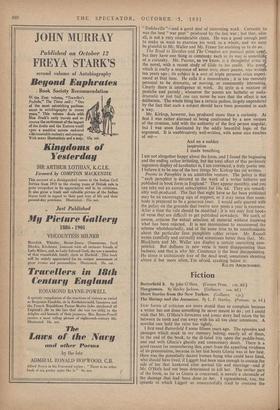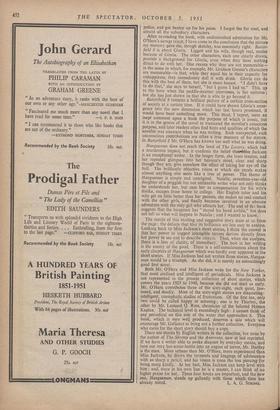Fiction
FEW forms of criticism are more stupid than to complain because a writer has not done something he never meant to do ; yet I could wish that Mr. O'Hara's ferocious and ironic story had taken the bit between its teeth and run away with his all too clear intentions. A novelist can hold the reins too tightly.
I first read Butterfield 8 some fifteen years ago. The episodes and passages which stuck in my memory belong, nearly all of them, to the end of the book, to the ill-fated trip upon the paddleboat, and end with Gloria's ghastly and unnecessary death. There is a good reason for remembering this, apart from the appalling vividness of its presentation, because in her last hours Gloria was at her best. Here was the potentially decent human being who could have lived, who should have lived, if Liggett had been man enough to sustain the side of her that hankered after normal life and marriage—and if Mr. O'Hafa had not been determined to kill her. The earlier part of the book, as far as Gloria is concerned, is merely a chronicle of the damage that had been done .to her. 1 resmembered, too, the episode in which Liggett so unsuccessfully tried to overawe the
pace, and got beaten up for his pains. I forgot the fur coat, and almost all the subsidiary characters.
After re-reading the book, with undiminished admiration for Mr. O'Hara's savage talent, I have come to the conclusion that the picture my memory gave me, though sketchy, was essentially right. Butter-
field 8 is about Gloria. Liggett and his wife, though real, matter because of Gloria. The other characters, each one clearly drawn, provide a background for Gloria, even when they have nothing direct to do with her. One reason why they are not memorable— in the sense in which, for example, Mr. Graham Greene's characters
are memorable—is that, while they equal his in their capacity for
unhappiness, they immediately dull it with drink. Gloria can do this with the best of them, but she is more honest. "I didn't have
to do that," she says to herself, " but I guess I had to." This, up to the hour when the paddle-steamer intervenes, is her epitome ; but she has just shown us that she is able to go beyond it.
Butterfield 8 remains a brilliant picture of a certain cross-section of society at a certain time. If it could have shown Gloria's emer- gence into the new dimension which her last hours promised, it
would have been something more. This must, I repeat, seem an inept comment upon a book the purpose of which is ironic, but
it is in the genius of the novel to transcend the novelist's conscious purpose, and later readers often find hints and qualities of which the novelist was unaware when he was writing. Such unexpected, such unconscious contributions are often a true •measure of his stature.
In Butterfield 8 Mr. O'Hara has known too well what he was doing. Hangsaman does not reach the level of The Lottery, which had a murderous impact, but it confirms the belief thaboMiss Jackson is an exceptional writer. In the longer form, she loses tension, and her repeated glimpses into her heroine's mind, clear and sharp though they are, give somehow the effect of taking her eye off the ball. The brilliantly objective vision at which she excels makes almost anything else seem like a loss of power. The theme of Hangsanzan is simple and unoriginal. Natalie, seventeen-year-old daughter of a priggish but not unlikeable writer who not only thinks he understands her, but uses her as compensation for his wife's dislike, escapes from home to college.. Her English tutor and his wife get on little better than her parents, she makes no real contact with the other girls, and finally becomes involved in an obscure adventure with the only girl who attracts her. The end of thr: book suggests that the hangman has "stayed his hand awhile," but does not tell us what will happen to Natalie ; and I wanted to know.
The merits of this exciting and suggestive story stare at us from the page: the defects that blur its brilliance are less easy to analyse.
Looking back to Miss Jackson's short stories, I think the answer is that her power to suggest intangible terrors derives directly from her power to see and to describe objects. Thus, when she analyses, there is a loss of clarity, of immediacy. The best in her writing is the enemy of the good. There is a self-consciousness about the early chapters of Hangsaman which was hardly ever apparent in the short stories. If Miss Jackson had not written those stories, Han gsa- man would be a triumph. As she did, it is merely an astonishingly good first novel. Both Mr. O'Hara and Miss Jackson write for the New Yorker, that most civilised and intelligent of periodicals. Miss Jackson is not represented in the present collection of short stories, which covers the years 1925 to 1940, because she did not start so early. Mr. O'Hara contributes three of the sixty-eight, each quiet, low- toned, and deadly. Most of the sixty-eight stories are disquieting: intelligent, unemphatic studies of frustration. Of the first ten, only two could be called happy or amusing ; one is by Thurber, the
other by Mr. Leonard Q. Ross, chronicler of the beloved Hyman
Kaplan. The technical level is exceedingly high: I cannot think of any periodical on this side of the water that approaches it. This
book, which is very well produced, deserves a sale which will encourage Mr. Gollancz to bring out a further collection. Everyone who cares for the short story should buy a copy.
There are stories by English writers in the collection, but none by the author of The Shrimp and the Anemone, now at last reprinted.
If we have a writer able to evoke disquiet by everyday means, and turn our very hot-water-bottle into an engine of terror, Mr. Hartley is the man. More urbane than Mr. O'Hara, more experienced than Miss Jackson, he draws the torments and longings of adolescence with as sharp a pencil, and his vision is none the less piercing for being more kindly. At her best, Miss Jackson can keep level with
him ; and, since in his own line he is a master, I can think of no higher praise for her. These four books are important, and the new one, Han gsaman, stands up gallantly with those which time has






















































 Previous page
Previous page